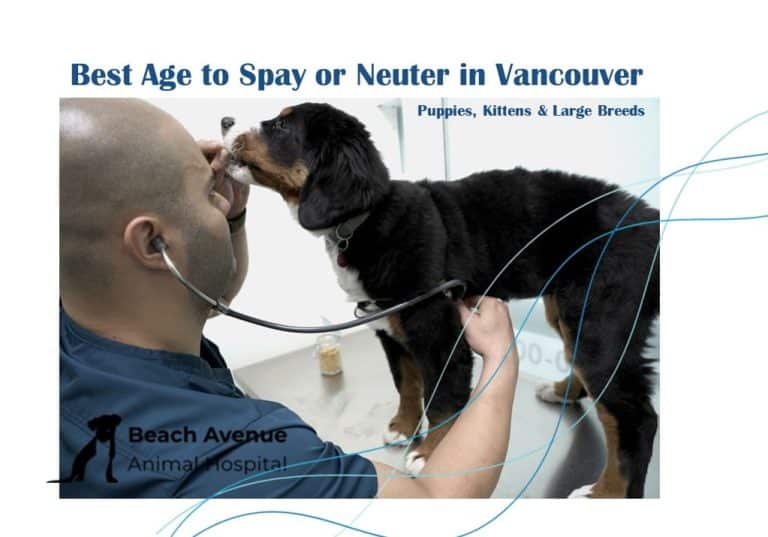Why Laser Therapy Isn’t Always the Answer
Laser therapy has become a trusted option for many pet owners in Vancouver. It’s non-invasive, drug-free, and often brings relief to pets with arthritis, chronic pain, or post-surgical recovery needs. But just like every medical treatment, laser therapy isn’t right for every case.
At Beach Avenue Animal Hospital, we believe in tailoring care to each pet’s needs. Knowing when laser therapy works—and when it doesn’t—is part of ensuring your furry family member gets the safest and most effective treatment possible.
Learn more about our Laser Therapy services here

When Laser Therapy Is Not Recommended
While laser therapy can be a powerful tool, there are some cases where it may not be the safest option:
-
Cancerous tumors – Laser can stimulate cell activity, which may worsen malignant growths.
-
Active infections – Heat and stimulation can spread or aggravate bacterial infections.
-
Eye conditions – Due to sensitivity, laser treatment is avoided near the eyes.
-
Pregnancy (abdomen area) – To prevent risk to developing puppies or kittens, laser therapy is not applied to the abdominal region.
-
Certain skin diseases or open wounds – Some conditions require other forms of treatment before laser can safely be considered.

These are just a few examples, but they show why professional evaluation is so important before beginning therapy.
Safe & Effective Alternatives for Pets
If laser therapy isn’t recommended for your pet, don’t worry—there are plenty of effective alternatives that our veterinary team may suggest instead:
-
Veterinary Surgery – When structural repair or correction is needed, surgery may provide the most lasting results.
-
Pain Management & Medication – For pets with chronic pain or inflammation, medications can be tailored for safe relief.
-
Physiotherapy & Rehabilitation – Exercise-based treatments can restore mobility and support healing, especially in older pets.
-
Pet Dental Care – Oral pain or inflammation often needs dental treatment, not laser.
At Beach Avenue Animal Hospital, we bring together multiple specialties to ensure your pet’s care plan is customized. Sometimes that means laser therapy; other times, it means choosing a safer, more suitable path.
Why Veterinary Expertise Matters
Laser therapy is most effective when applied in the right situations. But knowing when not to use it requires medical expertise. That’s where our team comes in.
By evaluating your pet’s full medical history, current condition, and long-term needs, we can recommend the safest and most effective approach—whether that includes laser therapy or not.
Meet our experienced veterinary team
The Right Treatment for the Right Pet
Every pet is unique, and so is their care plan. Laser therapy can be a wonderful tool, but it’s not a one-size-fits-all solution.
If you’re wondering whether your dog or cat is a good candidate for laser therapy—or what alternatives might work best—our team is here to guide you. Together, we’ll find the treatment that helps your pet live a healthier, more comfortable life.
Book a consultation with Beach Avenue Animal Hospital today.
FAQs
-
Is laser therapy safe for all dogs and cats?
No, laser therapy isn’t safe for every pet. Conditions like cancer, infections, and pregnancy often require different treatments. That’s why a veterinary exam is essential before starting. -
What are the side effects of veterinary laser therapy?
Side effects are rare but may include temporary redness, mild swelling, or discomfort. When applied correctly by a veterinary professional, it’s generally very safe. -
Can laser therapy cure arthritis in pets?
Laser therapy doesn’t cure arthritis, but it helps reduce inflammation, improve mobility, and ease chronic pain. It works best as part of a comprehensive pain management plan. -
Why shouldn’t laser therapy be used near tumors or infections?
Laser energy can stimulate cell growth and blood flow, which is risky for cancer or infection because it may worsen the condition. -
How many sessions of laser therapy are usually needed?
It depends on the condition. Some pets improve after 3–4 sessions, while chronic conditions may need ongoing treatment. Your vet will recommend a personalized plan. -
Is laser therapy better than medication for pain relief?
Not necessarily. In some cases, medication or surgery may be more effective. The best approach often combines treatments, depending on your pet’s specific condition. -
Do I need to visit a specialist clinic for laser therapy?
Yes. Not all clinics have the same technology or training. It’s worth traveling farther to ensure your pet receives Grade A veterinary services, as expertise and equipment quality directly impact safety and results. -
Can senior pets safely get laser therapy?
Many seniors benefit greatly, especially those with arthritis. However, each case is evaluated individually to ensure there are no contraindications. -
Is veterinary laser therapy painful for pets?
No. Most pets find it relaxing. It produces a gentle warming sensation, and many dogs and cats are calm or even fall asleep during sessions. -
What are the alternatives if my pet isn’t a candidate for laser therapy?
Alternatives include surgery, rehabilitation, pain management medications, and dental care—services that clinics like Beach Avenue Animal Hospital provide with an individualized approach.










